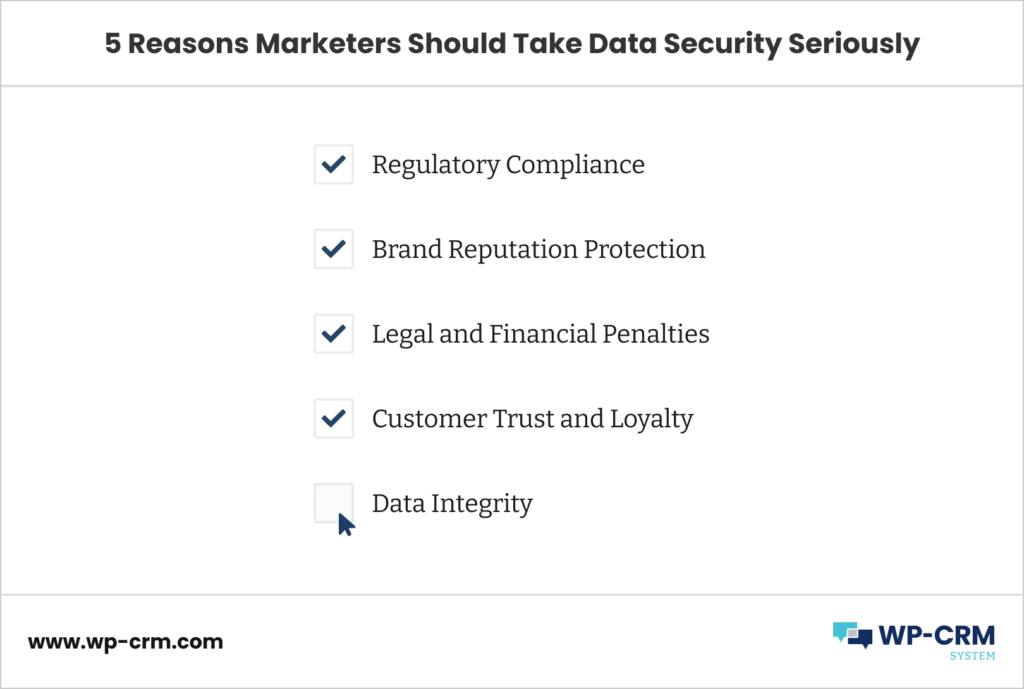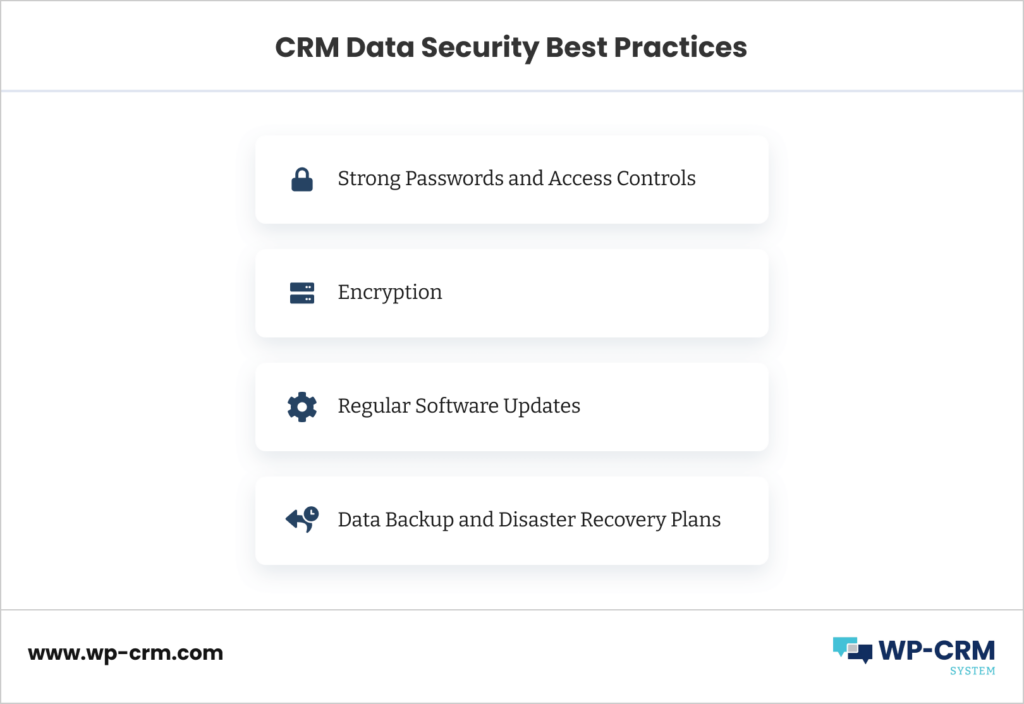Why Should Marketers Care About Data Security?
In the fast-paced world of modern marketing, data reigns supreme. Marketers leverage customer data to create tailored campaigns, establish connections, and drive businesses to success. Yet, amidst the dynamic landscape of data-driven marketing, one key aspect cannot be overlooked – data security.
Safeguarding your customers’ data with a solution like WP-CRM is not just a mere formality. It’s a powerful means to foster stronger relationships with your clientele and demonstrate a genuine commitment to their privacy.
In the digital age, personal data is a valuable currency, and consumers are increasingly aware of their rights and the importance of data privacy. This comes as no surprise as there is a hacker attack every 39 seconds! They willingly share their information with businesses, but in return, they expect that this data is handled with the utmost care and security. This exchange of trust forms the bedrock of customer relationships.
In this article, we will delve into the realm of data security, exploring its definition, the various measures that constitute it, and why marketers should place it at the forefront of their strategies. We will also discuss CRM data security best practices to help marketers protect and maintain the integrity of their valuable customer data.
What Is Data Security?
Data security is the fortress that safeguards digital information from unauthorized access, corruption, or theft. In the age of data-driven marketing, it plays a pivotal role in maintaining the trust of customers, ensuring regulatory compliance, and preventing data breaches. Security involves a multifaceted approach to protecting confidentiality, integrity, and availability.
Confidentiality
This aspect focuses on preventing unauthorized access to data. It involves measures such as access controls and encryption to ensure that data can only be accessed by individuals with the proper permissions.
Integrity
Data integrity assures that data remains unaltered and trustworthy. Any changes to data should be documented, and measures like digital signatures are employed to verify the authenticity of data.
Availability
Ensuring data is available when needed is another facet of data security. To achieve this, measures include disaster recovery plans and data redundancy, which ensure data remains accessible even in the face of unexpected incidents.
Technical Measures
These include encryption, firewalls, intrusion detection systems, and access controls. Encryption transforms data into an unreadable format, which can only be deciphered with the appropriate decryption key. Firewalls and intrusion detection systems are vital for monitoring and preventing unauthorized access, while access controls manage who can access specific data.
Physical Measures
Physical security controls safeguard data against unsafe physical access. Secure data centers, locked server rooms, and biometric access controls prevent breaches that could result from physical intrusion.
Administrative Measures
Administrative controls encompass security policies, procedures, employee training, and incident response plans. They are crucial for creating a culture of data security within an organization. These measures define best practices, govern data access, and dictate how security incidents are managed.
5 Reasons Marketers Should Take Data Security Seriously

Data security isn’t just an IT concern; it’s a fundamental aspect of modern marketing. Here are several compelling reasons why marketers should make data security a top priority:
1. Regulatory Compliance
In the era of digital data, governments and authorities have responded with stringent regulations to protect individuals’ privacy. GDPR (General Data Protection Regulation) in Europe, CCPA (California Consumer Privacy Act) in California, and HIPAA (Health Insurance Portability and Accountability Act) for healthcare data in the United States are just a few examples. Marketers are bound by these laws to protect customer data and adhere to data protection regulations.
Failing to comply with these regulations can lead to substantial fines and legal repercussions. For example, GDPR violations can result in fines of up to 4% of a company’s global annual revenue or €20 million, whichever is greater. Adhering to data security measures ensures regulatory compliance and avoids these severe penalties.
2. Brand Reputation Protection
A brand’s reputation is one of its most valuable assets. Data breaches and security lapses can swiftly tarnish a brand’s image and erode consumer trust. Consider the high-profile data breaches of major companies in recent years; their reputations took a substantial hit. Consumers want to know that the businesses they engage with take data security seriously.
By prioritizing data security, marketers can protect their brand’s reputation and maintain customer confidence. Demonstrating a commitment to safeguarding data creates a positive image of trustworthiness and responsibility, which can serve as a competitive advantage.
3. Legal and Financial Penalties
Data breaches can be costly in terms of both legal consequences and financial burdens. In addition to regulatory fines, organizations may face litigation from affected customers. Legal battles are expensive, time-consuming, and can result in significant payouts if a company is found negligent in its data security practices.
Moreover, data breaches can disrupt business operations, leading to financial losses due to downtime, loss of revenue, and remediation efforts. Investing in data security is a proactive way to avoid these financial and legal penalties, ensuring that a company remains financially stable and legally compliant.
4. Customer Trust and Loyalty
Consumers today are becoming increasingly privacy-conscious. They are more aware of their rights and the value of their personal data. Customers willingly share their information with businesses, but they expect that data to be handled with care and respect for their privacy. Demonstrating a commitment to data security is a powerful way to earn and maintain customer trust and loyalty.
5. Data Integrity
Marketing campaigns depend on the accuracy and reliability of customer data. Ensuring data integrity is vital for personalization, targeted marketing, and informed decision-making. Data security measures help maintain the integrity of customer data.
Without proper security, data may be corrupted or altered, leading to inaccurate customer profiles, marketing campaigns that miss the mark, and lost opportunities. By taking data security seriously, marketers ensure that their data remains consistent and reliable, allowing them to deliver personalized and effective marketing initiatives.
CRM Data Security Best Practices

Ensuring the security of customer data is particularly critical within CRM systems, which serve as the central repository for valuable customer information. Here are essential CRM data security best practices:
Strong Passwords and Access Controls
The first line of defense for any CRM system is a robust authentication process. Encourage users to create strong, unique passwords that include a combination of upper and lower-case letters, numbers, and special characters. Additionally, implement multi-factor authentication (MFA) to add an extra layer of security. MFA requires users to provide two or more separate factors (e.g., something they know, something they have, or something they are) to gain access to the CRM.
Access controls can also restrict data access to only those who need it for their job roles. Not every employee needs access to all customer data, so limiting access around job responsibilities helps reduce the risk of unsafe data exposure.
Encryption
Data encryption is a fundamental data security measure. Ensure that data is encrypted both in transit and at rest within the CRM system. Encryption ensures that even if unauthorized access occurs, the data remains unintelligible without the appropriate decryption key. Secure Sockets Layer (SSL) or Transport Layer Security (TLS) is essential for encrypting data in transit, while disk encryption secures data at rest.
Regular Software Updates
CRM software providers often release updates and patches to address known security vulnerabilities. It’s crucial to keep your CRM system up to date with the latest security patches and updates. Outdated software can have known vulnerabilities that attackers can exploit to gain access or compromise data.
Frequently review and test the updates in a staging environment before applying them to your production CRM system to ensure they don’t introduce new issues or conflicts.
Data Backup and Disaster Recovery Plans
Data loss and security incidents can happen, so it’s essential to have robust data backup and disaster recovery plans in place. Regularly back up your CRM data and website to secure locations. These backups should be offsite to ensure they’re not affected by physical disasters or security breaches in your primary location.
In case of a data breach or a catastrophic event like a fire or a server failure, a disaster recovery plan outlines the steps for data restoration and system recovery. You need to regularly test this plan to ensure that, in the event of a crisis, you can quickly recover your data and minimize downtime.
Additionally, consider implementing a fail over or redundant system to ensure business continuity in case of CRM system failures. This can involve having duplicate servers or cloud alternatives that can be seamlessly activated if your primary CRM system experiences issues.
In Closing
Data security is not an option; it’s a necessity for modern marketers. Protecting customer data isn’t just about regulatory compliance; it’s about maintaining trust, safeguarding your brand’s reputation, and preserving data integrity. By implementing strong passwords, encryption, regular software updates, and disaster recovery plans within your CRM system, you ensure that customer data remains safe and reliable. In today’s privacy-conscious world, these practices are not just best practices; they’re prerequisites for success. Prioritizing data security is a commitment to both responsible marketing and the longevity of your customer relationships.
